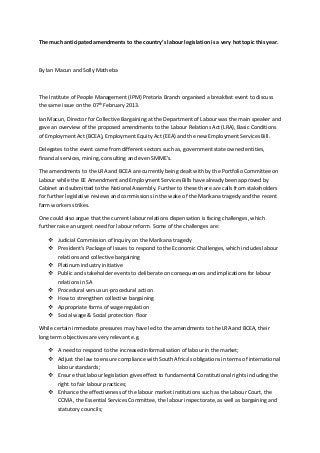
People dynamics article 2013 by Ian Macun and Solly Matheba
- 1. The much anticipated amendments to the country’s labour legislation is a very hot topic this year. By Ian Macun and Solly Matheba The Institute of People Management (IPM) Pretoria Branch organised a breakfast event to discuss the same issue on the 07th February 2013. Ian Macun, Director for Collective Bargaining at the Department of Labour was the main speaker and gave an overview of the proposed amendments to the Labour Relations Act (LRA), Basic Conditions of Employment Act (BCEA), Employment Equity Act (EEA) and the new Employment Services Bill. Delegates to the event came from different sectors such as, government state owned entities, financial services, mining, consulting and even SMME’s. The amendments to the LRA and BCEA are currently being dealt with by the Portfolio Committee on Labour while the EE Amendment and Employment Services Bills have already been approved by Cabinet and submitted to the National Assembly. Further to these there are calls from stakeholders for further legislative reviews and commissions in the wake of the Marikana tragedy and the recent farm workers strikes. One could also argue that the current labour relations dispensation is facing challenges, which further raise an urgent need for labour reform. Some of the challenges are: Judicial Commission of Inquiry on the Marikana tragedy President’s Package of Issues to respond to the Economic Challenges, which includes labour relations and collective bargaining Platinum industry initiative Public and stakeholder events to deliberate on consequences and implications for labour relations in SA Procedural versus un-procedural action How to strengthen collective bargaining Appropriate forms of wage regulation Social wage & Social protection floor While certain immediate pressures may have led to the amendments to the LRA and BCEA, their long term objectives are very relevant e.g. A need to respond to the increased informalisation of labour in the market; Adjust the law to ensure compliance with South Africa’s obligations in terms of international labour standards; Ensure that labour legislation gives effect to fundamental Constitutional rights including the right to fair labour practices; Enhance the effectiveness of the labour market institutions such as the Labour Court, the CCMA, the Essential Services Committee, the labour inspectorate, as well as bargaining and statutory councils;
- 2. Clarify uncertainties that have arisen from the interpretation and application of the LRA and BCEA in the past decade. In general the amendments deal with the following four key aspects; temporary employment services, dispute resolution, collective bargaining and compliance and enforcement. There have been strong calls out there for a review or total eradication of the labour broking system. The Bills are in a way responding to some of the alleged abuses in the labour market: Labour Brokers roll-over contracts of employees thereby making workers permanent temporary employees; Workers employed by Labour Brokers earn less than their counterparts employed by clients doing the same job; Workers employed by Labour Brokers not able to take up their dismissal cases to the CCMA/Labour Court and not able to enforce decisions (under who the employer is); Workers employed by Labour Brokers often do not have access to social benefits (e.g. retirement funds) It is therefore evident the temporary employment practice is facing a major shakeup in the near future. Temporary employment will be limited to a period not exceeding 6 months and must be for genuinely temporary work. Temporary employees must be treated the same as permanent workers unless there is a justifiable reason. Temporary employees protected against unfair dismissal Temporary employees (and trade unions) may pursue either the TES or the client in cases of abuse However, protection applies only to those earning below the BCEA threshold of R183,008.00 The question to be asked, which came from some of the delegates at the event, is “what will be the impact of these amendments on business”. Several concerns are raised as practitioners start weighing the pros and cons of the proposals. These are the cost of doing business, contracting arrangements & enterprise flexibility, changes to management-trade union relations, access to CCMA & Labour Court and costs versus benefits. From a government point of view there has been an attempt to take the interests of business into account and there is a fair balance between regulation and flexibility. Such areas that promote flexibility in the amendments are: High income earners excluded from provisions relating to temporary employment and fixed- term contract; Guidelines for justifiably different treatment of temporary and fixed-term contract workers; Allowance for fixed-term contracts where there are justifiable reasons;
- 3. Use of fixed-term contract of 6 months as probation period; Exemption applications from collective agreement and appeals to be dealt with in 30 days; Businesses employing less than 10 employees or employing less than 50 and who has been in operation for less than 2 years excluded from section dealing with fixed term contracts. In summary the amendments to LRA and BCEA focus on Regulating labour brokers and atypical forms of employment; Adding protection for vulnerable workers; Facilitating unionisation in vulnerable sectors; Improving the functioning of labour market institutions, including the CCMA, bargaining and statutory councils; Addressing current problems in industrial disputes and dispute resolution. This is very likely going to be an active topic this year and calls for HR to be alert. It offers a great opportunity for HR practitioners (especially in the IR/ER space) to take a lead in facilitating the implement thereof. It is therefore very important that we proactively start engaging and debating these proposals before it is time to implement.